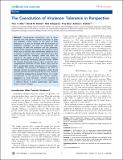The coevolution of virulence : tolerance in perspective
Abstract
Coevolutionary interactions, such as those between host and parasite, predator and prey, or plant and pollinator, evolve subject to the genes of both interactors. It is clear, for example, that the evolution of pollination strategies can only be understood with knowledge of both the pollinator and the pollinated. Studies of the evolution of virulence, the reduction in host fitness due to infection, have nonetheless tended to focus on parasite evolution. Host-centric approaches have also been proposed-for example, under the rubric of "tolerance", the ability of hosts to minimize virulence without necessarily minimizing parasite density. Within the tolerance framework, however, there is room for more comprehensive measures of host fitness traits, and for fuller consideration of the consequences of coevolution. For example, the evolution of tolerance can result in changed selection on parasite populations, which should provoke parasite evolution despite the fact that tolerance is not directly antagonistic to parasite fitness. As a result, consideration of the potential for parasite counter-adaptation to host tolerance-whether evolved or medially manipulated-is essential to the emergence of a cohesive theory of biotic partnerships and robust disease control strategies.
Citation
Little , T J , Shuker , D M , Colegrave , N , Day , T & Graham , A L 2010 , ' The coevolution of virulence : tolerance in perspective ' , PLoS Pathogens , vol. 6 , no. 9 , e1001006 . https://doi.org/10.1371/journal.ppat.1001006
Publication
PLoS Pathogens
Status
Peer reviewed
ISSN
1553-7374Type
Journal item
Collections
Items in the St Andrews Research Repository are protected by copyright, with all rights reserved, unless otherwise indicated.

